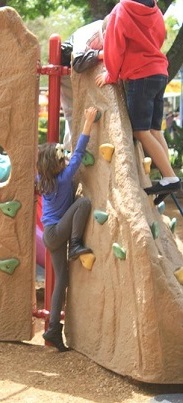Play leaders are people who create and manage play opportunities. Sometimes play leaders are people who are fulfilling a duel role. They can be parents, teachers, pre-school teachers or nannies, who look after both the play needs, and other needs of children in their care. Some play leaders are employed specifically to concentrate on managing the play needs of children. They may be an assistant to a teacher or care worker, or they may be employed in a supervised playground, play centre or other facility that focuses on play.
This course will develop valuable skills in anyone working, or wishing to work with children. Our staff have experience training play leaders since the late 1970s, our knowledge in the industry is extensive and current. We have devised this truly fantastic course which will challenge you and arm you with the skills you need to succeed in this vitally important industry. Children deserve the best!
- Benefits of a structured program
- Factors to consider in planning choices
- Issues for effective programming - people, purpose, participation, relevance, flexibility, evaluation
- Program planning process
- Types of program
- Dimensions of a program
- Participants goals
- Personal characteristics
- Ideas
- Socio-physical context
- Participants approach to achieving goals
- Participant behaviour
- Perceptions of consequences
- Ideas
Lesson 4. Child Development through Play
- Levels of child development
- Theories of Learning in Infancy and Early Childhood
- What is learning
- Habituation
- Vicarious learning
- Classical conditioning
- Operant conditioning
- Cognitive development
- Jean Piaget’s theory
- Importance of play - Exploratory play, Constructive play, Symbolic play, Pretend play
- Assimilation and accommodation
- Socialisation
Lesson 5. Play Safety
- Play versus safety
- Legal considerations
- Age and safety
- Safety in exercise
- Safety in aerobic activities
- First aid facilities
- Oxygen equipment
- Identifying hazards
- Basic safety audit for play spaces
- Pre screening participants
- Legal liability
- When is liability a problem
- Contributory negligence
- Insurance
- Inspecting play equipment
Lesson 6. Physical Play
- Manipulating and changing the environment
- Plant associations
- Playing with the environment - animals, plants, earth, manufactured things
- Trailing - sensory trails, cryptic puzzle trails
- Gardening, animals, collecting, crafts, sports
- Environmental activities - observing, collecting, aquaria, an antarium, asphalt activity, other examples
- Organised exercise classes for children
- Exercise programs for different age groups
- For intellectually and physically disabled
- Configurations or patterns of movement
Lesson 7. Social Play
- Significance of social play
- Influences on social behaviours
- Benefits of social play
- Social facilitation
- Developing social skills
- Stimulation by social play
- Impediments to social play
- Strategies to facilitate social play
- Social play activities
Lesson 8. Adventure Play
- What is an adventure playground
- Establishing an adventure playground
- Playleader duties in an adventure playground
- Site design
- Playground facilities for disabled
- All accessible playgrounds
- Dedicated playgrounds
- Liability
Lesson 9. Play Apparatus
- Toys
- Playground equipment
- Big toy playgrounds
- Environmental features
- Equipment (consumables)
- Tools
- Naturally occurring materials for play
- Painting and paints
Lesson 10. Play Activities
- Scope of activities
- Crafts - weaving, candle making, bark pictures, mosaics etc
- Growing crystals
- Camping
Lesson 11. Special Project Planning an after school play program
Each lesson culminates in an assignment which is submitted to the school, marked by the school's tutors and returned to you with any relevant suggestions, comments, and if necessary, extra reading.
Aims
- Explain the purpose of play in the cognitive, physical and social development of a child.
- Determine the skills required to carry out a play leadership role in different situations
- Plan a supervised children's play program.
- Describe the impact of play upon the psychological development of a child.
- Determine appropriate measures to take to protect a child's safety when at play, while minimising any interference which might diminish the quality of the play experience.
- Explain options for physical play activities, including games and sports, in a supervised play program.
- Explain options for social play activities, in a supervised play program.
- Plan, establish and manage a supervised adventure
- Evaluate a range of different play apparatus, including playground structures, toys, sports equipment, commenting on quality, safety features, appropriate applications and cost benefit.
- Expand your knowledge of opportunities that can be offered for children to play, appropriate to a wide range of different situations.

This is a 100hr course - Study at your own pace
PLAY LEADERSHIP
Play leaders are people who create and manage play opportunities.
Sometimes play leaders are people who are fulfilling a duel role. They can be parents, teachers, pre school teachers, or nannies, who look after both the play needs, and other needs of children in their care.
Some play leaders are employed specifically to concentrate on managing the play needs of children. They may be an assistant to a teacher or care worker, or they may be employed in a supervised playground, play centre or other facility that focuses on play.
Play is far more important than most people think.
Children who play well develop properly.
Children who are deprived of play opportunities will develop abnormally,
and are likely to suffer problems as a result later in life.
Adults who cannot or do not play usually suffer greater stress.
Children in fact learn more life skills through play, than they do through formal education.
Levels of Childhood Development
 Child psychology is concerned with the development of a person during childhood. This involves the development of a child’s mental capacity (ie. cognitive development); and the development of their emotional and social behaviour.
Child psychology is concerned with the development of a person during childhood. This involves the development of a child’s mental capacity (ie. cognitive development); and the development of their emotional and social behaviour.
It is important to state that most of these forms of development do not simply cease as a child reaches adulthood. Adults also are capable of growing and changing in terms of their mental, emotional and social behaviours. Some characteristics are however more easy to develop and change during childhood.
It is important to note that any distinction between cognitive, emotional and social aspects of behaviour are purely theoretical (ie. the distinction is made simply to help us learn and understand, but in reality, you should think of these aspects overlapping and blending with each other, rather than being distinctly separate parts of the child’s character.
When problems develop in any area of development, they usually become rapidly evident in other areas as well. The study of child psychology is partly concerned with identifying such interrelationships.
Needless to say, child psychologists are particularly interested in discovering the causes of certain patterns of behaviour in children. They are interested, for instance, in how the child’s environment and relationships (eg. home, school and neighbourhood) affect the child’s development. This involves an attempt to establish causes.
They are also interested in "outcomes" of certain childhood experiences; for example, how does the experience of living in a poverty stricken environment affect the later behaviour of the child?
It is difficult to identify "one" solitary cause for any behaviour. Usually behaviour is far more complex, having been influenced by a mixture of prior experiences.